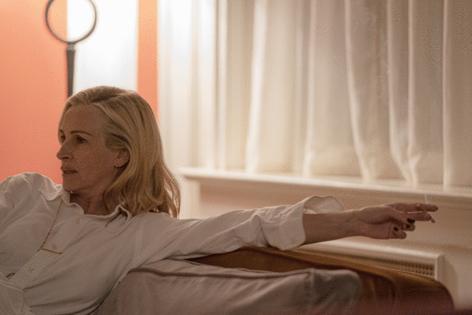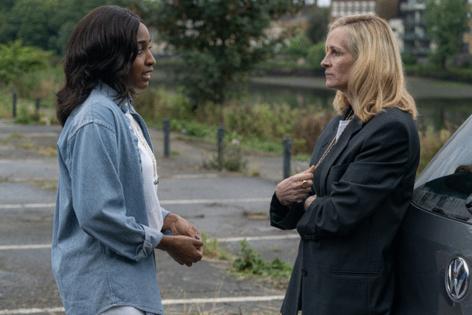'After the Hunt' review: More challenging work by Luca Guadagnino
Published in Entertainment News
Filmmaker Luca Guadagnino isn’t in the business of making you, the viewer, comfortable.
Were he, he probably wouldn’t have given the world “Bones and All,” a 2022 romance horror featuring cannibals as its lovestruck protagonists.
The latest from the prolific Italian director — whose credits also include the acclaimed movies “Call Me by Your Name” (2017), “Suspiria” (2018) and 2024 offerings “Challengers” and “Queer” — is “After the Hunt,” which is getting a wide release this week after opening last week in select markets.
Working from the debut screenplay of actor Nora Garrett, Guadagnino presents what on the surface is a twisty, psychological #MeToo thriller, but he’s more interested in mining themes including ambition, ethics, race and gender than in simply keeping us guessing as to who is telling the truth. (That is, of course, part of the equation.)
He does this largely successfully; while “After the Hunt” is engrossing, thanks in part to solid-to-strong work from stars Julia Roberts, Ayo Edebiri and Andrew Garfield, it also feels as if it may collapse under its ponderous weight at any moment.
Guadagnino makes you uncomfortable from the film’s opening moments, in which we hear a loudly ticking clock as he introduces us to Roberts’ Alma Imhoff, a respected philosophy professor at Yale University, in the morning in the lavish apartment she shares with her psychiatrist husband, Frederik (Michael Stuhlbarg). The tick-tick-ticking continues into the day at the college, eventually giving way to the soothing sounds of “A Child Is Born” by Tony Bennett and Bill Evans that night at a party hosted by the Imhoffs.
Things are no more comfortable at the social gathering, however, as alcohol consumption helps lead to some increasingly uneasy conversations among the hosts and guests, who include Garfield’s Hank — a fellow Yale philosophy prof who, like his friend Alma, hopes he is on the cusp of becoming tenured — and Edebiri’s Maggie Resnick — her prized student, who is working on her dissertation.
Hank and Maggie leave at the same time, Alma watching them through her keyhole and seeing them appear to be quite chummy as they wait for the elevator.
A day or so later, Maggie comes to Alma with an accusation against Hank: After walking her home and essentially inviting himself in for a nightcap, he continued with sexual advances after she’d told him to stop. Alma presses her for details, seemingly questioning the truthfulness of her student’s account, which appears to hurt Maggie.
Soon, Hank comes to Alma with his version of events, allowing that the drink in Maggie’s home was a mistake but that he wanted to press her on what he believes was plagiarism in her dissertation. His claims explain her motivation to conjure up the notion that an assault took place.
Alma seeks to use the fact that she is close with both Maggie and Hank — two people, Frederik asserts, she’s helped to elevate at Yale because they worship her and are attracted to her sexually, which she enjoys — to stay out of the university’s investigation into the claim. This, of course, angers both parties.
Ultimately, “After the Hunt” is a character study of Alma, a reasonably successful one even as it piles on elements that include an overindulgence in alcohol and pill popping to manage pain, the cause of which remains a mystery nearly until the end of the film. Is she the innocent bystander she proclaims, or is she using this situation with the power to ruin Hank’s career to her advantage? And does she truly care about Maggie at all?
Roberts (“Pretty Woman,” “Leave the World Behind”) is mostly up to the task of keeping us invested in this woman, who is alternately relatable and navigating a complex world of academia that many of us will never know.
As for the key supporting players, Garfield (“Under the Banner of Heaven,” “Tick, Tick… Boom!”) outshines “The Bear” standout Edebiri, although that may be due in part to the character of Hank being more fleshed out than Maggie, whom Garrett and Guadagnino are determined to make into an enigma.
In limited screentime, Stuhlbarg (“A Serious Man,” “Call Me by Your Name”) is entrancing, commanding scenes with a mesmerizing gaze and dialogue delivery that refrains from going over the top. As Frederik, he does go big in one scene, coming in and out of the kitchen with showmanship as he cranks music in the background while Alma and Maggie engage in an important conversation, but that, too, is a delight.
Artfully shot by Malik Hassan Sayeed (“He Got Game”) — working as the director of photography on a narrative feature film for the first time in more than a quarter of a century — the film is a mixed bag visually. Unusual — and, yes, uncomfortable — framings of characters’ faces as they speak work thematically, but do close-ups of their hands?
The sound work, including the sometimes-unsettling score by the ever-busy tandem of Trent Reznor and Atticus Ross — responsible for the music of the recently released “Tron: Ares” under the banner of rock act Nine Inch Nails — is a more clear-cut triumph.
It would be nice to say that’s what “After the Hunt” is as a whole, but it’s hard to get there. Nonetheless, this is a film that pulls you in and refuses to let you go for more than two hours — and one likely to spark lively conversation afterward, however uncomfortable that conversation may be.
———
‘AFTER THE HUNT’
3 stars (out of 4)
MPA rating: R (for language and some sexual content)
Running time: 2:18
How to watch: In wide theatrical release Oct. 17
———
©2025 The News-Herald (Willoughby, Ohio). Visit The News-Herald (Willoughby, Ohio) at www.news-herald.com. Distributed by Tribune Content Agency, LLC.
















Comments